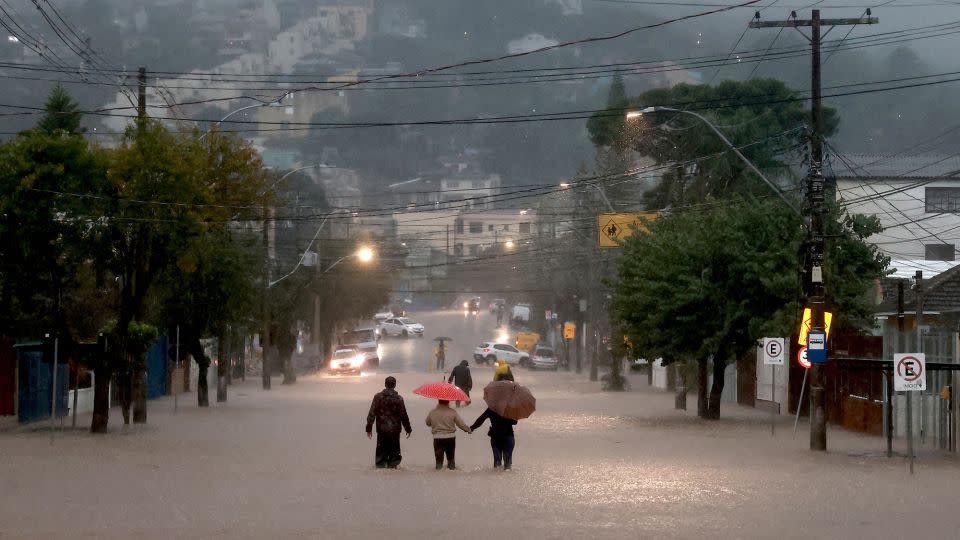UN chief says world is on ‘highway to climate hell’ as planet endures 12 straight months of unprecedented heat
The planet just marked a “shocking” new milestone, enduring 12 consecutive months of unprecedented heat, according to new data from Copernicus, the European Union’s climate monitoring service.
Every single month from June 2023 to May 2024 was the world’s hottest such month on record, Copernicus data showed.
The 12-month heat streak was “shocking but not surprising” given human-caused climate change, said Carlo Buontempo, the director of Copernicus, who warned of worse to come. Unless planet-warming fossil fuel pollution is slashed, “this string of hottest months will be remembered as comparatively cold,” he said.
Copernicus released its data the same day as United Nations Secretary General António Guterres made an impassioned speech in New York about climate change, slamming fossil fuel companies as the “godfathers of climate chaos” and, for the first time, explicitly calling on all countries to ban advertising their fossil fuel products.
Guterres urged world leaders to swiftly take control of the spiraling climate crisis or face dangerous tipping points. “We are playing Russian roulette with our planet,” he said Wednesday. “We need an exit ramp off the highway to climate hell.”
As temperatures surge, global climate commitments are “hanging by a thread,” he warned.
Copernicus’ data showed each month since July 2023 has been at least 1.5 degrees warmer than temperatures before industrialization, when humans started burning large amounts of planet-heating fossil fuels.
The average global temperature over the past 12 months was 1.63 degrees above these pre-industrial levels.
Under the Paris Agreement in 2015, countries agreed to limit global heating to 1.5 degrees above pre-industrial levels. While this aim refers to warming over decades, rather than a single month or year, scientists say this breach is an alarming signal.
“This is a harbinger of progressively more dangerous climate impacts close on the horizon,” said Richard Allan, a climate professor at the University of Reading in the UK.
The news comes as the western US is experiencing its first heat wave so far this summer with temperatures soaring into the triple digits. But unprecedented heat has already left a trail of death and destruction across the planet this spring.
Dozens have died in India over the past few weeks as temperatures pushed toward 50 degrees Celsius (122 Fahrenheit); brutal temperatures in Southeast Asia have caused deaths, school closures and shriveled crops; and as heat surged in Mexico, howler monkeys dropped dead from trees.
Hotter air and oceans also fuel heavier rainfall and destructive storms like those that have battered the United States, Brazil, Kenya and the United Arab Emirates, among other nations, this year.
The recent heat offers “a window into the future with extreme heat that challenges the limits of human survivability,” said Ben Clarke, a researcher at Imperial College London’s Grantham Institute. “It is vital people understand that every tenth of a degree of warming exposes more people to dangerous and potentially deadly heat,” he told CNN.


“Extreme events turbocharged by climate chaos are piling up, destroying lives, pummeling economies and hammering health,” Gutteres said.
Humanity is having an outsized impact on the world, he said, likening it to the meteor that began the process of wiping out dinosaurs 66 million years ago.
“In the case of climate, we are not the dinosaurs,” Guterres said. “We are the meteor. We are not only in danger. We are the danger.”
An even hotter future
Global temperatures are expected to start dropping below record-breaking levels in the next few months as El Niño — a natural climate phenomenon that tends to boost the planet’s average temperature — weakens.
But that won’t mean an end to the long-term trend of rising temperatures as humans continue to burn planet-heating fossil fuels. “While this sequence of record-breaking months will eventually be interrupted, the overall signature of climate change remains and there is no sign in sight of a change in such a trend,” Buontempo said.
Guterres’ speech also referenced new data released by the World Meteorological Organization, which found a nearly 86% chance that at least one of the years between 2024 and 2028 will break the hottest-year record, set in 2023.
The WMO also calculated a nearly 50% chance that global average temperatures over the entire five-year period between 2024 and 2028 would be more than 1.5 degrees above pre-industrial levels. That would bring the world closer to breaching the longer-term 1.5-degree limit at the heart of the Paris Agreement.

Guterres laid blame for the climate crisis firmly at the doorstep of fossil fuel companies that “rake in record profits and feast off trillions in taxpayer-funded subsidies,” he said.
These companies have spent billions of dollars over decades “distorting the truth, deceiving the public and sowing doubt,” he added. He called on every country to ban fossil fuel ads, similar to advertising bans implemented around the world for other products that harm human health, such as tobacco.
“We are at a moment of truth,” he said, adding that the battle for a liveable planet would be won or lost in this decade.
He called on world leaders to take immediate action, including huge cuts in planet-heating pollution and an immediate end to any new coal projects. He pushed rich countries to commit to quitting coal by 2030, reducing oil and gas by 60% by 2035 and increasing the flow of funding to the poorest, most climate-vulnerable nations.
“We cannot accept a future where the rich are protected in air-conditioned bubbles, while the rest of humanity is lashed by lethal weather in unliveable lands,” Guterres said.
For more CNN news and newsletters create an account at CNN.com

